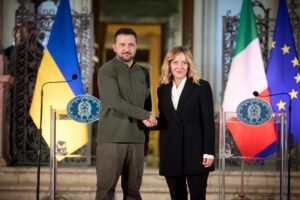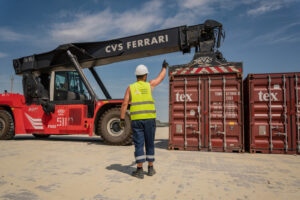
Ukraine has significant reserves of titanium, graphite, manganese, lithium, uranium, and other critical materials and will work to establish production of components for batteries, solar panels, and defense technologies, This vision for the development of critical materials (CRM) was presented by Deputy Minister of Economy Andriy Telyupa at the URC2025 Recovery Conference in Rome.
“The goal is to attract more than $2 billion in investments and launch more than 20 projects in five years. In the future, Ukraine should become not only an exporter of raw materials, but also a production base for green and defense tech within the EU,” he wrote on Facebook.
According to an Interfax-Ukraine correspondent, unlike previous programs, URC2025 included two separate events dedicated to CRM: a session and a workshop. Among the participants, in addition to representatives of the Ukrainian government, were representatives of the DFC, EBRD, DECOMAR, DG GROW, Chemours, Horizon Capital, TechMet, and BGV Group Management.
In addition, Telyupa presented Ukraine’s industrial strategy concept at the conference, which aims to create a modern economy with high added value to strengthen the country’s security and integrate it into EU production chains.
“The focus is on sectors where we have competitive advantages: machine building, steel, titanium, lithium, graphite, as well as the IT sector and renewable energy. By the end of 2025, we will finalize the strategy, with implementation planned for 2026-2030.
We are developing it jointly with the World Bank, the OECD, UNIDO, and the Kyiv School of Economics,“ the deputy minister said.
He also presented the ”Industrial Ramstein” initiative, created by analogy with the Defense Rammstein format, to mobilize international assistance for the restoration and modernization of industry.
“The initiative provides for the transfer of equipment as humanitarian aid through G2G mechanisms, partial procurement financing programs, the involvement of export credit agencies to cover risks and reduce the cost of loans, B2B missions, staff training, and certification of production facilities in accordance with international standards,” Telyupa explained.
According to him, in addition, the URC2025 presented the “Green Platform,” a digital catalog of over 60 green financing programs for businesses, communities, and enterprises, created in collaboration with the Green Transition Office and integrated into the Made in Ukraine portal.
“(The catalog) will become a single point of entry for anyone looking for funding for energy-efficient, resource-saving, and low-carbon solutions,” said the deputy minister.
According to an Interfax-Ukraine correspondent, First Deputy Prime Minister and Minister of Economy Yulia Svyrydenko also signed a new project with the United Nations Industrial Development Organization (UNIDO) worth $188 million from the Japanese government for green industrial reconstruction.
Telyupa emphasized that this project involves technology transfer and the creation of joint ventures with Japanese companies. Within its framework, more than 30,000 Ukrainians will acquire new skills, and Ukrainian manufacturers will test and implement more than 40 advanced technologies in agro-processing, circular economy, IT, renewable energy, water, energy efficiency, and telemedicine.

Italy is interested in investing in Ukraine and is ready to invest resources without delay, sign agreements, and provide financial guarantee instruments for companies that plan to invest in Ukraine’s reconstruction measures, Italian Prime Minister Giorgia Meloni says.
“Italy, as a country, is also ready to contribute and start now and rebuild what was destroyed – roads, bridges, hospitals, all these buildings,” Meloni said at the Ukraine Recovery Conference (URC2025) during a joint statement with Ukrainian President Volodymyr Zelensky to reporters in Rome on Thursday.
She noted that Italy has already taken Odessa under its patronage to restore cultural and heritage objects. “And we want to even go further, we want to expand our contribution: this is energy, critical infrastructure, transportation, agriculture, also health care. Of course, I won’t list all the initiatives now, but I want to remind you that we are doing a lot of things that are symbolic in terms of humanitarian aid,” the head of the Italian government said.
Meloni also noted that Italy will help in the heroic resistance to Ukraine. “We have done it in different senses and we will also do it on industry and also defense sector and cooperation. We have also talked about this, and this is evidenced by a number of agreements signed today, this is a central theme. And, of course, we will continue our investments, because we understand how important it is to do everything possible so that Ukraine can fight, fight back, defend itself,” she said.
According to the Italian Prime Minister, peace in Ukraine should be “long, lasting, just”, in particular through deterrence.

The European Bank for Reconstruction and Development (EBRD) plans to provide a loan of up to EUR 50 million to Nova Poshta LLC of the Nova Group of Companies (GC) to finance part of its capital investment program for 2025-2026, with a focus on improving operational efficiency and supporting the company’s development strategy in Ukraine during the war.
“… includes improving physical infrastructure, optimizing and expanding the network, modernizing IT systems, improving energy management, and restoring human capital,” the bank lists the elements of Nova Poshta’s development strategy on its website.
It is noted that the loan will be multi-currency with the possibility of selecting funds in hryvnia and euros and will consist of two tranches: tranche 1 in the amount of EUR 35 million will be reserved from the moment of signing, tranche 2 in the amount of EUR 15 million will be reserved by the bank solely at its discretion.
The total cost of the project, according to the report, is EUR 69.1 million.
The EBRD reminds that Nova Poshta is the leading private postal and courier operator in Ukraine, with a network of more than 12,000 branches and 27,000 post offices and about 34,000 employees. Every month, the company provides services to more than 11 million customers in Ukraine.
This project, which has passed the final review stage and is awaiting approval, possibly in June, is the fifth in the history of relations between Nova Group and the EBRD.
It is noted that under the existing loan, in May 2025, the company informed the bank of a planned reduction of about 2,900 employees, which is less than 10% of the total number. The EBRD emphasizes that the analysis of this reduction process confirmed that the client complies with the terms of such collective dismissals stipulated in the loan agreement, provided a detailed description of the reduction process, has an effective grievance system and responds appropriately to them without any litigation, and has an effective process of interaction with the trade union, which is informed about the large-scale restructuring plan that will affect employees throughout 2025.
As reported, last August, the EBRD provided a EUR 70 million loan to Nova Group to finance its investment program for 2024.
According to Nova Poshta’s financial report for the first quarter of 2025, its net consolidated revenue increased by 20.7% compared to the first quarter of last year to UAH 14 billion 333.2 million, while net profit decreased by 21.4% to UAH 567.7 million. The ultimate beneficial owners of the company are Volodymyr Popereshnyuk and Viacheslav Klymov.
As noted by the Standard Rating agency, as of the beginning of April this year, with total accounts payable of UAH 13.51 billion, Nova Poshta used, in addition to long-term bank loans, resources raised from the issue of two series of bonds – E and F series of UAH 1 billion each.

The Kyiv School of Economics (KSE) plans to invest $10 million in the internal renovation of the Golf Club in Obolon, Kyiv, which it recently acquired for $18 million, so that the campus created on its premises meets the requirements of leading world universities, KSE President Timofey Milovanov said.
“About $10 million will go toward internal renovation, not external. Everything there needs to be demolished, and laboratories, amphitheaters, and makerspaces need to be built. … Filling the campus itself with high-quality, modern educational facilities, such as those found in top universities, will cost $10 million,” he said in an interview with Interfax-Ukraine.
According to Milovanov, KSE sent a team to MIT (Massachusetts Institute of Technology) to see what a makerspace is.
“This is where students have access to all modern robots, lasers, machine tools with software control — everything they need to make a prototype if they have an idea. All the equipment must be there, from projectors to lecture halls, and there must be access to software that costs money even for universities,” explained the KSE president.
He added that there are plans to open these makerspaces for students from other universities as well.
Milovanov recalled that the first KSE building in Kyiv, located at 3 Shpaka Street, cost $2.5 million, with another $2.5 million spent on renovations: shelter, sleeping capsules, library shelves, AI cameras that allow hybrid lectures, a security system, fire safety, modern ventilation, batteries, and generators in case of blackouts.
Some of this is already in place at the Golf Club, but it was designed for a small number of people, not the several thousand students who will be working here, added the KSE president. Among other things, he pointed to the building’s well-insulated basements, which can be used as shelters for all students and teachers.
He emphasized that he was very pleased with the purchase because the Golf Club was built to a very high standard, so the price of the deal was very attractive considering the location—$18 million for 14,500 square meters of space plus 5 hectares of land on lease.
“Even if you don’t count the land and the location near the Dnieper, that’s $1,200 per square meter! (…) But now there are no buyers. If people have $20 million, they will buy a hotel in Indonesia, not invest in Ukraine. I think this is simply a factor of the war, and we are very lucky—without the war, it would have been many times more expensive,” Milovanov believes.
According to him, in theory, the first students could use the renovated building as early as January next year, although in practice it may take longer, partly because of the existing tenants, with whom KSE would like to resolve the issue without any disputes.
“But there are two buildings at the Golf Club. One of them is empty—there are no tenants. So we are already starting demolition this week, and it may be ready sooner. That is where we will build makerspaces, amphitheaters, and other significant renovations,” said the KSE president.
He emphasized that the university will maintain the land’s sporting purpose, as stipulated in the lease agreement.
“We will do everything completely according to the law, so we will leave the golf course. Some good businessmen are already writing to us about how this can be improved. So maybe there is something in this direction,” Milovanov said.
At the same time, he said that in the future, KSE would like to expand the purpose of the land plot so that it fully corresponds to the university, so it will submit all the documents to the Kyiv City Council.
“I think it will take 5-7 years. But we have no other way, because we are an American company. Although local developers tell me: Timofey, why are you doing this? Do what you have to do, and you’ll figure it out later. But we don’t do that, we are an American company. We don’t know how to decide things like that,” he emphasized.
KSE is a private university and research center founded in 1996. It operates as a non-profit organization registered in the United States. Since 2022, KSE donors have contributed more than $150 million to humanitarian, defense, and educational projects, including the development of university infrastructure.
GOLF CLUB, INVESTMENT, KYIV SCHOOL OF ECONOMICS, RECONSTRUCTION

Today, consumers around the world, and in Ukraine in particular, are increasingly choosing natural products that are associated with a healthy lifestyle. Juices, as one of the key segments of the beverage market, not only meet this trend, but also demonstrate a steady increase in demand. For businessmen looking for profitable areas for investment, juice production offers attractive prospects: a relatively low entry threshold, quick payback, and significant potential for scaling. In this article, we will analyze global and Ukrainian market trends, provide key figures and facts, and explain why it is worth paying attention to this industry right now.
Global juice market: figures and trends
The global juice market remains one of the most dynamic segments in the beverage industry. According to the analytical company Statista, in 2024, its volume reached about $18.5 billion, maintaining a stable annual growth rate of 5-7%. Forecasts for 2025 indicate a further increase in the market to $20 billion, driven by growing demand for natural products and innovative approaches to production.
Key global trends:
Large players such as Tropicana (PepsiCo), Minute Maid (Coca-Cola), and Innocent Drinks dominate the mass segment, while local brands with organic, cold-pressed, and functional juices are winning the premium market.
Ukrainian juice market: untapped potential
The Ukrainian juice market has unique features that make it attractive to investors. According to the Ukrainian Agribusiness Association, the average per capita consumption of juice is only 10 liters per year. For comparison, this figure reaches 30 liters in the EU and 50 liters in the US. This means that the Ukrainian market is far from being saturated and has a huge room for growth.
Key characteristics:
Market leaders:
Financial analysis of juice production: why is it profitable?
Juice production in Ukraine is not only a response to trends, but also an economically sound business. Here are the key arguments:
It is worth clarifying that the payback period of several months primarily refers to the workshop itself, not the business as a whole. This figure takes into account only the costs of equipment and raw materials at maximum line utilization. However, a full-fledged business includes additional costs: salaries for accountants, sales managers, logisticians, and warehouse workers, as well as rent, taxes, and marketing. If you already have well-established sales and supply channels, the payback period may be closer to these terms. However, in real-world conditions, where there are no ideal scenarios, you should focus on a more realistic timeframe of about 6-12 months. That’s how long it usually takes for juice production to start generating stable profits, depending on external factors and the efficiency of your business model.
These simple calculations demonstrate that launching juice production is not only an opportunity to occupy a profitable niche in the market, but also to ensure a quick return on investment. Investing in modern equipment allows you to reduce production costs and increase profit margins, which is especially important in a highly competitive environment.
Minimum set of equipment for juice production
To organize a full-fledged production process, it is necessary to equip the workshop with a line that includes a number of specialized machines and devices. Using the equipment listed below, you can achieve a capacity of up to 30,000 liters per month, which is ideal for medium-sized businesses with the prospect of scaling up:
– Industrial juicers
Designed for processing large volumes of raw materials, which makes them indispensable in large-scale production. Particularly noteworthy is the STvega J 1500 masticating juicer. Its high productivity and squeezing efficiency allow you to optimize the production process and ensure high quality of the final product.
The approximate cost of this line can be around $50-80 thousand, while it can generate $10-20 thousand in gross revenue per month after reaching a volume of 500-1000 liters of juice per day.
But you can start with much smaller investments. Some of the operations can be done manually with the help of human resources, and then you can use only the most necessary equipment, such as a juicer, filters, and pasteurizers. In this case, you can start with 5-10 thousand dollars and test your idea.
Where to buy juice production equipment?
When choosing a supplier of equipment, it is important to consider not only the quality of the equipment, but also the level of service support, warranty service, and technical support. STvega is one of the market leaders specializing in the sale of modern equipment for the food industry.
Why choose STvega:
– Wide range of products: We offer equipment from China, Europe and Ukraine, which allows you to choose the best solution for any business.
– Warranty and post-warranty service: The company’s specialists provide full support and technical assistance at all stages of operation.
– Competitive prices: High quality at affordable investment terms makes the purchase as profitable as possible.
– Individual approach: Consultations on the selection of equipment for your budget and needs.
By investing in a production line from STvega, you get not only modern equipment, but also a partner who will help you grow your business and quickly achieve your goals.
Conclusion.
Today, investors are looking for opportunities that combine stability and high income potential. One of the most promising ways is to invest in your own production – your business. This is not just a reliable investment, but also a chance to create something real: a product that will be in demand, generate profit and allow you to control every stage of development. This approach provides not only financial return, but also long-term value, because you are building a business that works for you and meets modern market trends.
If you want to know more or get advice on the selection of equipment, please contact our specialists. For example, our company STvega has good experience in supplying equipment for juice production. We will help you make an informed choice, calculate the cost and lay a solid foundation for a successful start of your business.
Juice production is a business with a clear model that fits perfectly into the current trends of healthy eating and support for local producers. The global market is showing steady growth, and Ukraine has all the conditions for rapid development: from cheap raw materials to export opportunities. By investing in this segment today, you can not only make a quick profit, but also gain a foothold in an industry that promises to remain relevant for decades. It’s time to act – the market is waiting for new players!

In 2024, Lemtrans, Ukraine’s largest private rail transportation operator, increased its investments by 2.9 times compared to 2023 to UAH 478 million, while total transportation volume decreased by 6% to 15.9 million tons.
“Lemtrans continues to work to ensure the logistics and economic stability of Ukraine by supplying critical raw materials and investing in new infrastructure projects… In 2024, the group allocated more than UAH 478 million for infrastructure and logistics projects, which is three times higher than in 2023, when investments amounted to more than UAH 160 million,” Lemtrans’ press service said on Tuesday.
The company has invested in the development of terminals and container business, allocating UAH 441 million in this area, the statement said.
In the second half of 2023, the construction of a modern container terminal in Vinnytsia was completed. Lemtrans also continued to implement an investment program aimed at maintaining the railcar fleet and further improving the efficiency of railcar repair facilities. The volume of scheduled and current repairs of freight cars in 2024 reached 5,635 units.
Lemtrans’ total transportation volume in 2024 amounted to 15.9 million tons, which is 6% less than in 2023, the press service reported.
Coal accounted for the bulk of transportation – 10.9 million tons. Iron ore was the second largest (2.3 million tons). In addition, the company transported 2.01 million tons of construction materials and 0.6 million tons of other cargo in 2024, the report said.
“Starting from the third quarter, coal transportation decreased due to the massive attacks by Russia on Ukraine’s energy infrastructure. Damage to production assets led to a reduction in transportation volumes by shippers,” the company’s press service explained.
Based on the results of their activities in 2024, the companies that are part of the Lemtrans group transferred more than UAH 712 million in taxes and fees to the budgets of all levels. This is 30% less than in 2023, when UAH 929 million was paid.
“In 2024, Lemtrans transferred about UAH 647 million to the state budget. Local budgets were replenished by UAH 66 million. In addition, Lemtrans Group paid more than UAH 59 million in unified social tax, the press service said.
“Despite the challenges of wartime, we continue to invest in infrastructure projects… The container terminal in Vinnytsia expands the access of Ukrainian enterprises to world markets, contributing to the growth of export-import operations and strengthening the economic potential of both the region and the country as a whole. This is especially important in the current environment, when economic sustainability is a key factor for Ukraine,” Lemtrans CEO Volodymyr Mezentsev said, as quoted by the press service.
Earlier it was reported that Yegor Grebennikov, co-owner of the port operator Transinvestservice (TIS), will become a co-owner of the Mostyska Dry Port project in Vinnytsia, which Lemtrans is implementing jointly with Rail Investment. The relevant permission was granted by the Antimonopoly Committee.